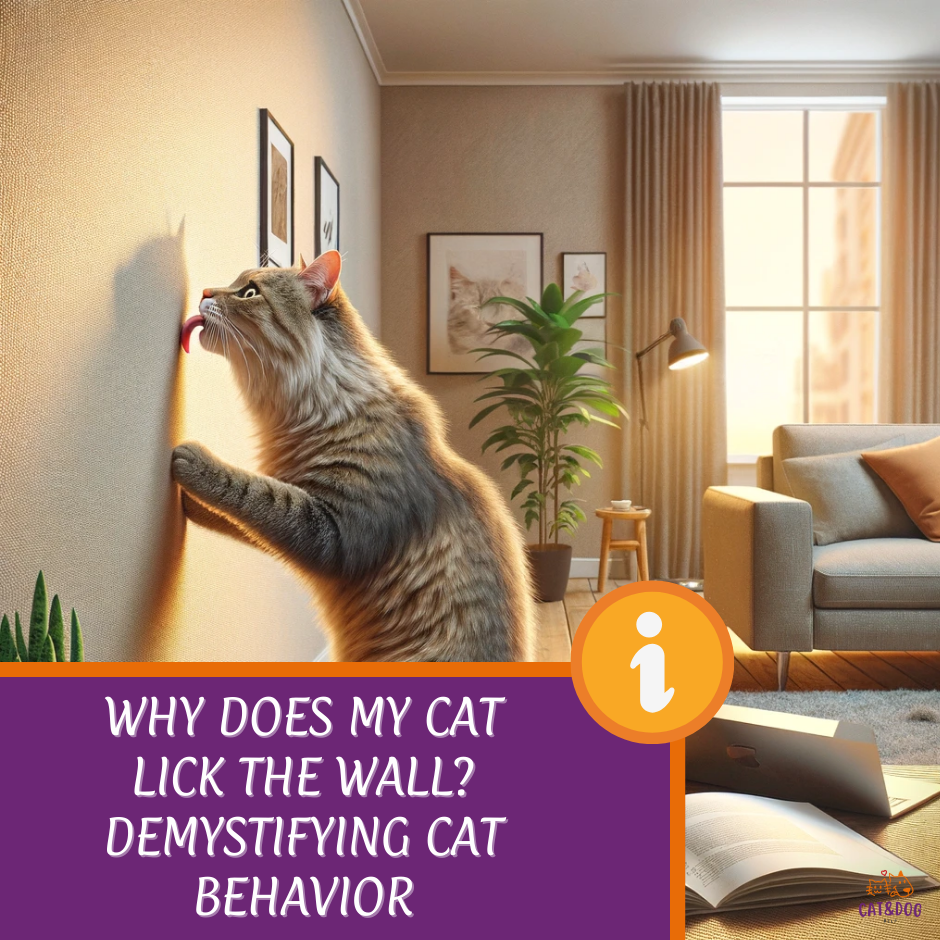It’s a scenario that baffles many cat owners, sparking the question, “Why does my cat lick the wall?”
This peculiar behavior often leaves them scratching their heads, wondering what’s happening in their feline friend’s mind. While it might seem like just another cat quirk, wall licking could signal a range of issues.
It ranges from mere curiosity to more serious health concerns. In some cases, it might even be a cat’s way of responding to moisture or condensation on walls, especially in humid environments.
Understanding “why does my cat lick the wall” can open the door to fascinating insights into cat behavior and well-being.
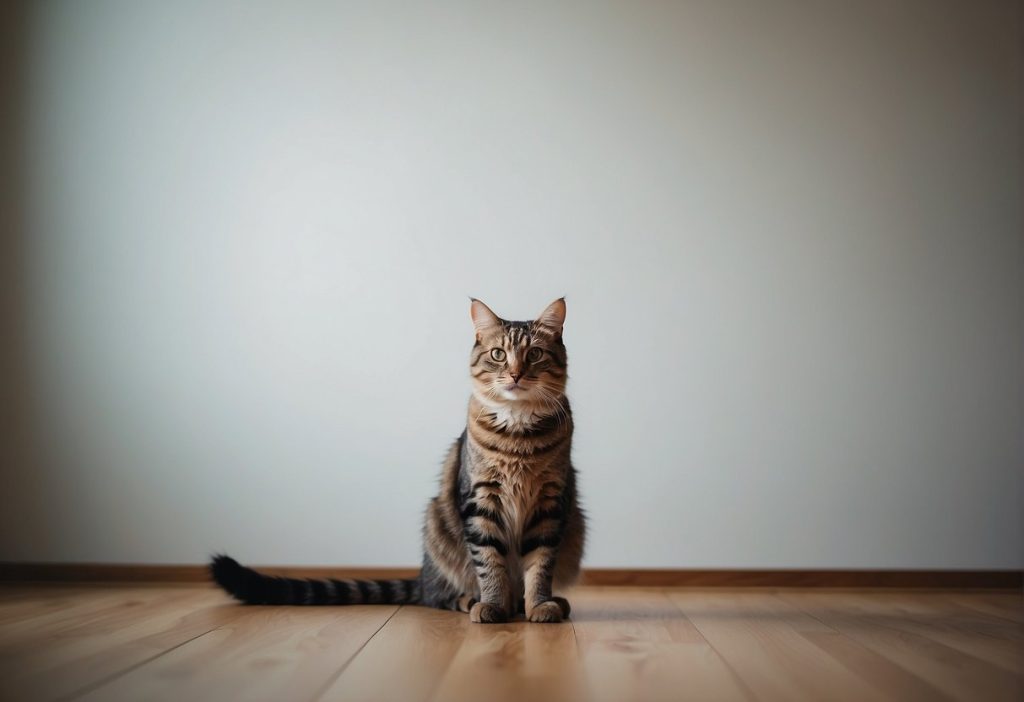
As we explore this topic further, we’ll dive into the reasons that might cause your cat to treat your walls like a lollipop.
Is it a behavioral quirk, a sign of stress, or could it potentially be an indicator of a medical or nutritional need?
This article will sift through the evidence and expert opinions to give you the insights you need to understand and address this peculiar habit.
After all, keeping your cat healthy and content is a top priority, and sometimes that means unraveling the mysteries of their most baffling behaviors and examining their living space in the United States.
So let’s get right to it and peel back the layers of this feline puzzle together.
Key Takeaways
- Wall licking in cats may indicate stress, curiosity, or health issues.
- Understanding the behavior necessitates exploring various factors such as environment, diet, and psychological well-being.
- Addressing unusual behaviors like wall licking involves observing, consulting with a vet, and implementing appropriate care strategies.
Understanding the Behavior: Why Does My Cat Lick The Wall
Cats, often shrouded in mystery, have their quirky behaviors, but wall licking can leave you scratching your head.
Why Do Cats Do It?
First, let’s tap into the feline mind. Naturally, cats are curious creatures. Their ancestors needed sharp instincts to survive, and those instincts still drive modern housecats.
They often explore their surroundings through scent and taste—yes, even if that means giving your wall a taste test!
It’s Not Just About Curiosity
Sometimes, this behavior can stem from something more. Have you noticed your cat becomes a wall-licking aficionado when there’s a change in the household?
Or maybe when the dreaded vacuum cleaner comes out? Here’s what could be happening:
- Stress and Anxiety:
Just like us, cats can feel the pressure. When their environment feels unpredictable, they might turn to repetitive behaviors, like licking walls, to soothe themselves. (1) - Boredom:
Ever gotten so bored you considered watching Paint Dry? Well, cats can get bored too. If they’re not getting enough play, they might turn to your walls for entertainment.
Texture, Taste, or Trace Elements?
What about the wall itself? Your cat might be intrigued by:
- The texture of the wallpaper or paint.
- A taste they fancy, especially if there’s a hint of spilled food or fascinating cleaning products.
Remember, these are just potential reasons your feline friend might have taken up this peculiar pastime. Cats are individuals with unique personalities, so your cat’s reasons could be as unique as they are.
Keep an eye on this behavior, provide plenty of stimulation, and consult a vet if you’re concerned about possible causes—it’s always best to rule out any health issues.
Additionally, you may want to consider using a cat fountain to ensure your cat always has access to fresh, flowing water, as many cats prefer this over stagnant water in a bowl.
A cat fountain can provide the fresh, flowing water that cats instinctively seek, making it a great option for keeping your cat hydrated and happy.
Health and Nutrition: Medical Perspectives
Ever caught your cat in the act, tongue to the wall, and wondered what’s up with that? Well, your fuzzy friend’s wall-licking habit might be more than just a quirky pastime.
Let’s dig into the health and nutrition angle, shall we?
Common Health Issues Linked to Wall Licking:
- Pica:
This is a condition where cats eat non-food items. It could be a sign your cat is missing something in their diet. (2) - Dental Issues:
Painful teeth or gums can lead to licking behaviors as a way to cope. - Nutritional Deficiencies:
An imbalanced diet might lead to licking as your cat tries to find missing nutrients. (3)
Nutritional Factors:
Ensuring your cat has a well-rounded diet is like a shield against weird behaviors. The right balance of proteins, vitamins, and minerals keeps their licking to their bowl, not your wall. (4)
Veterinarian Insights: Experts agree that odd eating can be a red flag. Take, for instance, a case where a cat with an iron deficiency began licking walls obsessively.
A tweak in their diet, and voilà – the wall became just another part of the furniture.
So, what’s the takeaway? If your cat’s tongue has taken a liking to your decor, a vet chat might just be the thing to get to the bottom of it.
It’s not about overreacting; it’s about caring for your quirky companion. Keep an eye out for the signs and keep those meals complete. Your cat, and your walls, will thank you.
In-Depth Behavioral Analysis and Expert Insights
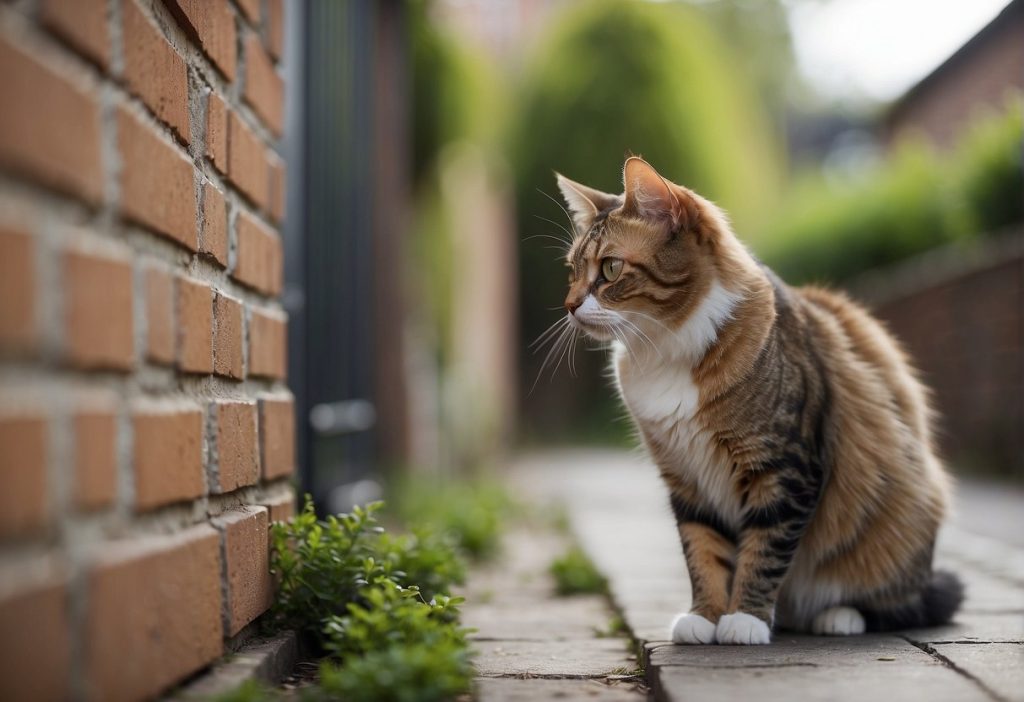
Cats are mysterious creatures, and their behavior can sometimes be baffling. Let’s get into the whisker-twitching details.
Why Wall Licking?
- Stress Relief:
Much like you might bite your nails, cats lick things to calm their jitters. Next time you see your cat going to town on a wall, consider if anything in their environment has changed recently. - Curiosity and Taste:
Cats explore the world with their tongues. Maybe there’s a hint of tuna from dinner on the wall, or perhaps they simply like the texture. It’s the feline version of a taste test! - Health Issues:
Pica, the craving for inedible objects, can sometimes be behind your cat’s wall art tonguescapades. If it’s more than just a passing quirk, a trip to the vet is a good idea. (5)
Expert Mewsings
- Behavioral Insight:
Animal behaviorists note that compulsive licking could signal underlying health problems.
Keep an eye on the frequency — if your wall starts looking like a licked candy cane, it might be time for expert advice. - Nutritional Deficiencies:
Some cats lick walls due to a lack of certain nutrients. Is your kitty’s diet balanced? It could be worth looking into with your vet. - Environmental Enrichment:
A scratching post or toys might redirect that wall-loving feline. Environmental enrichment is key to a happy, healthy cat, as any cat whisperer will tell you!
Remember, each cat is a universe unto itself, and what’s true for one may not apply to another.
Stay observant, keep things stimulating, and consider professional guidance when your cat’s behavior seems more like a riddle wrapped in a mystery inside an enigma.
There’s a reason the internet is crazy about these adorable enigmas, after all!
As pet parents, it is important to understand our cat’s behavior and provide them with the love and attention they need to feel safe and reduce cat’s stress.
By providing a comfortable hiding place or finding ways to reduce stress triggers, we can help our feline friends feel more at ease in their environment.
Case Studies and Psychological Insights
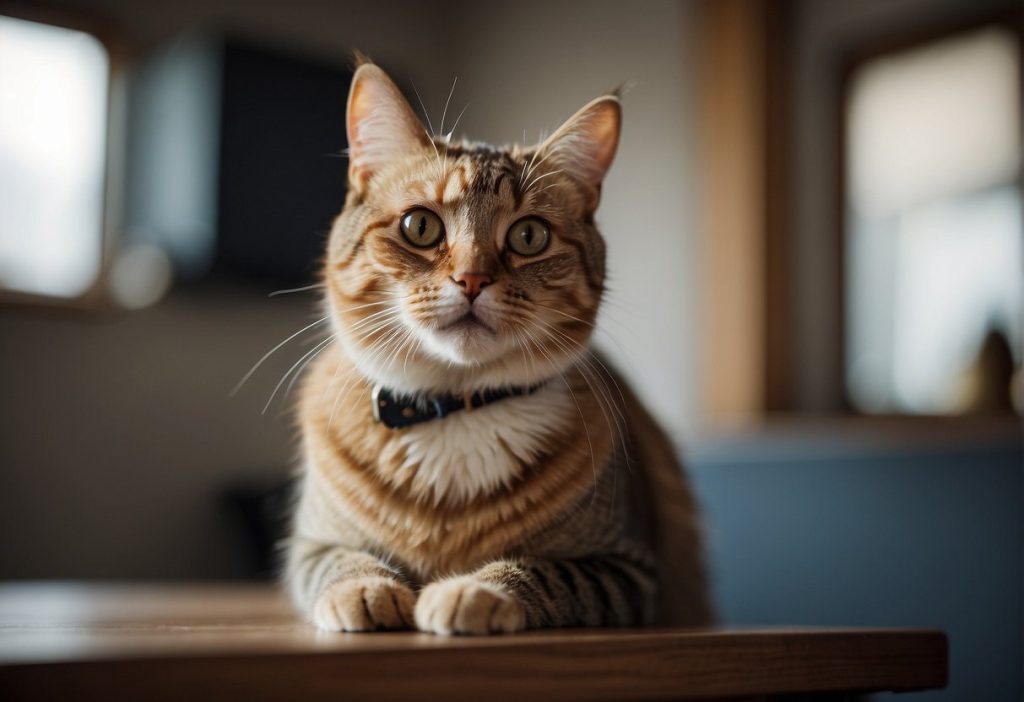
Imagine Fluffy, a typically playful cat whose owner noticed her incessant wall-licking.
A little sleuthing revealed stress as the culprit, after a move to a new home and the introduction of a new pet, a new baby.
Fluffy’s case isn’t unique, and it’s a prime example of how psychological factors, such as the introduction of a new baby, can drive such behavior.
Common Psychological Triggers:
- Stress & Anxiety: Like Fluffy, cats may lick walls as a way to cope with stress.
- Compulsive Disorders: Repeated wall-licking can be akin to human compulsions, a need to repeat behaviors to reduce psychological discomfort.
- Attention-Seeking: Yes, some cats are the divas of the pet world, licking walls to turn your eyes their way.
Let’s dig into the why:
- Cats, much like humans, crave stability. Changes in their environment or routine can prompt anxiety-related behaviors.
- Compulsive behaviors, including wall-licking, offer a form of self-soothing for cats feeling out of sorts.
- Sometimes, it’s as simple as a bid for attention. Ignoring kitty lately? That wall-licking might just be their equivalent of waving a little paw and saying, “Hey, look at me!”
In managing these behaviors, several approaches can be taken:
- Environmental Enrichment: Creating a stimulating environment can dissuade unwanted licking.
- Behavioral Therapy: Consult a vet or an animal behaviorist for tailored strategies.
- Attention and Playtime: Regular interaction with your cat can both prevent and reduce wall-licking episodes.
Remember, every cat like Fluffy, has its quirks, but obsessive wall-licking isn’t just a quirky behavior—it can be a signpost of underlying issues.
So, keep an eye out and ensure your furry companion’s mental and emotional well-being!
The Science Behind the Behavior
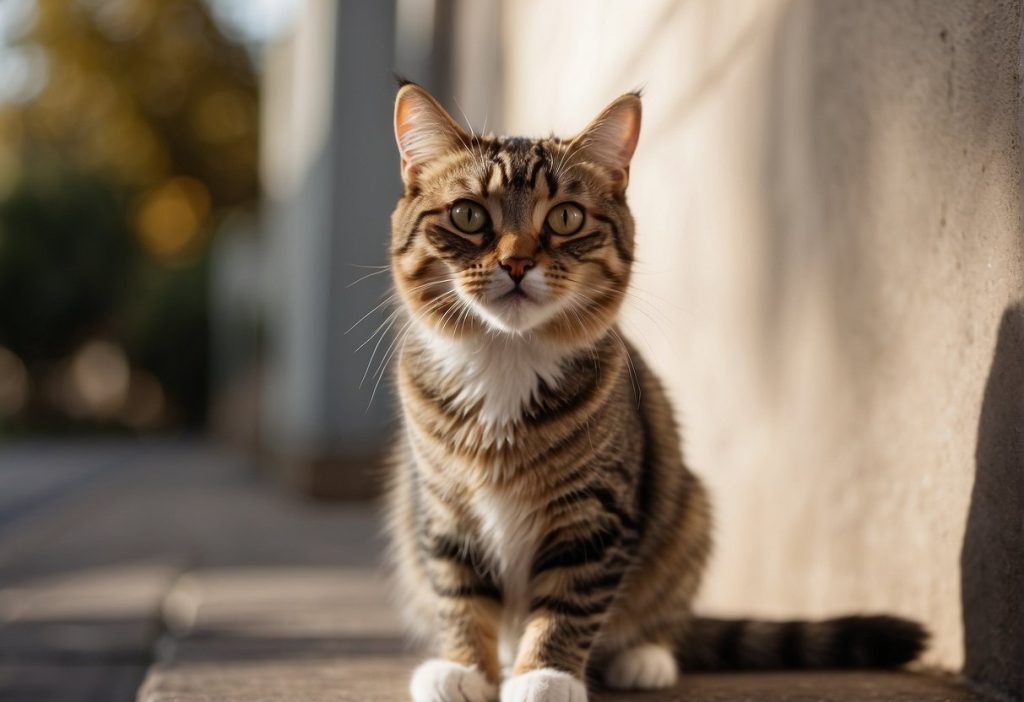
It might seem like quirky behavior, but there’s often science to back up these feline antics. Let’s break down why your wall might be the target of your cat’s curious tongue. Image Credit: Goran Horvat, Pixabay.
1. The Texture and Taste Appeal
Your cat’s unique sensory system might find the texture or taste of the wall intriguing.
Surfaces that feel different under their tongue or have a hint of enticing flavors (like remnants of food or interesting scents) could make for a delightful licking experience.
- Taste: Sometimes, substances like paint or wallpaper glue can have flavors that cats find appealing.
- Texture: Cats may enjoy the roughness of a brick wall or the smoothness of painted drywall.
2. Marking Their Territory
Cats have scent glands on their cheeks and lips. Licking objects can be a way of marking their territory with their scent, letting other animals know “I was here.”
3. Seeking Nutrients
In some rare instances, a cat might be licking walls due to a lack of minerals in their diet, though this is less common.
4. Health-Related Causes
Although it’s not pleasant to think about, sometimes persistent licking can signal health issues, such as:
- Dental problems
- Gastrointestinal issues
If your cat’s wall-licking becomes excessive, it’s time for a vet visit.
5. Stress Response
Recent studies have shown that cats may lick objects as a self-soothing behavior when they’re feeling anxious or stressed.
So, if your cat starts giving the wall some attention, it’s typically not a cause for immediate concern.
However, paying attention to the frequency and context can help determine whether this habit is just a passing curiosity or something worth discussing with your vet.
Keep an eye out for any changes in behavior, and remember, your vet is always the best source for health-related inquiries.
Addressing and Managing the Behavior
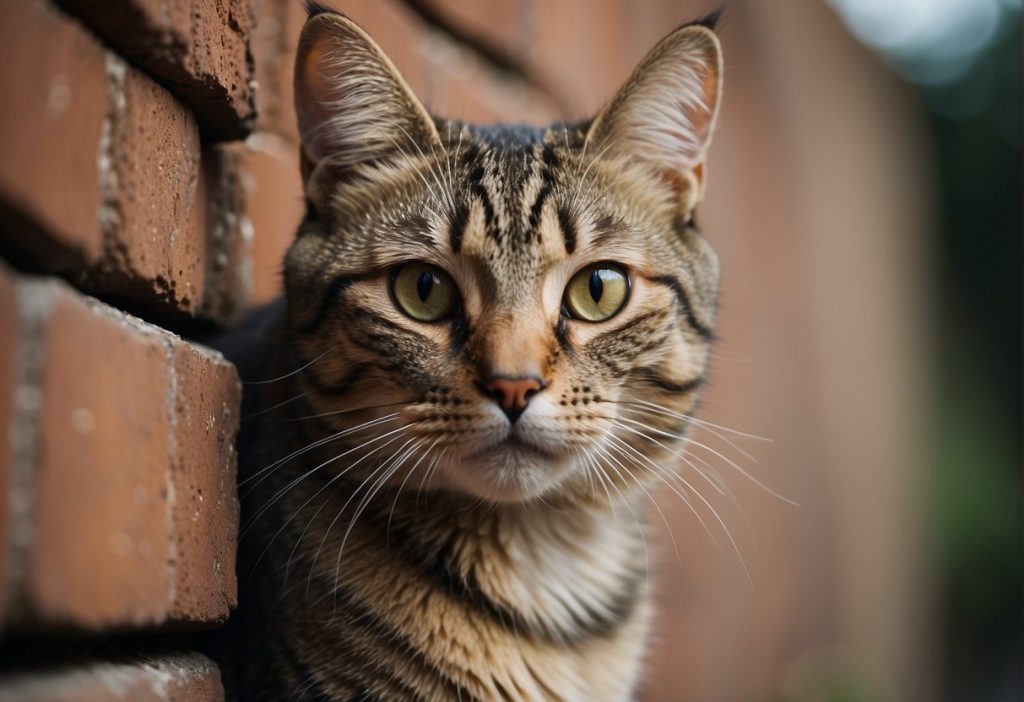
Redirect the Lick:
Sometimes, your furry pal just needs a more appropriate outlet for their licking.
- Offer them lickable treats or toys designed for cats.
- Consider a food puzzle to engage their mind and tongue.
Check the Environment
Your home should be a stress-free sanctuary for your whiskered roommate.
- Minimize loud noises and sudden changes that may cause anxiety.
- Provide cozy hideaways and perches for a sense of security.
Supervise and Distract
Catch them in the act? Divert their attention!
- Engage in interactive play with a laser pointer or feather wand.
- Initiate cuddle time—many cats can’t resist a good chin scratch.
If these tricks aren’t doing the trick, it might be time to call in the pros.
- Medical Concerns?
Visit your vet to rule out any health issues. - Behavioral Expertise:
An animal behaviorist can offer personalized advice.
Remember, patience is key. You’re already on the right track by seeking solutions. Keep it up, and you’ll help your cat kick the habit in no time!
Preventive Measures and Ongoing Care
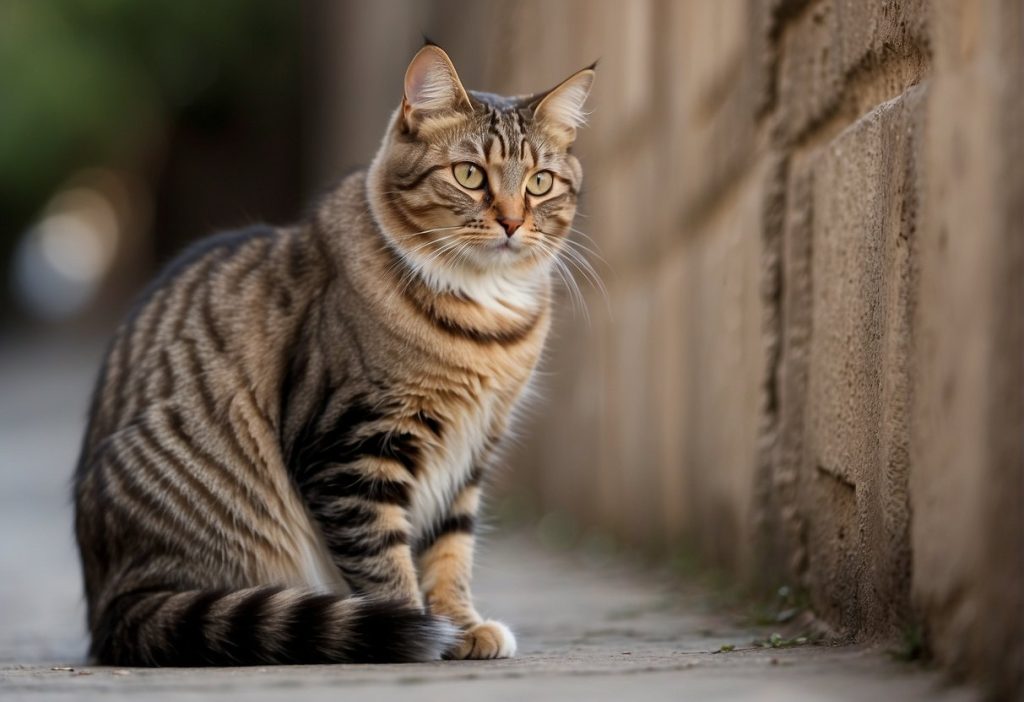
Let’s dive into some lively yet practical steps to keep your whiskered pal from turning your walls into a lickable canvas.
Environmental Enrichment
Imagine being home all day with nothing to do. You’d be climbing the walls, quite literally! The same goes for your cat.
- Playtime:
Rotate different types of toys to keep things fresh and exciting. Ever tried a laser pointer? Cats often can’t resist them! - Climbing and Perching:
Cats love heights, so consider cat trees or wall shelves to explore. - Windows to the World:
A cozy spot by the window can provide hours of entertainment. Bird watching is a popular feline pastime!
Health Checkups and Diet Management
Remember, a stitch in time saves nine — and that holds for kitty care, too!
- Routine Vet Visits:
Cats are masters of disguise, especially when they’re under the weather. Regular checkups can catch the sneaky issues before they become big problems. - Mind the Menu:
What goes into your cat matters. A balanced diet tailored to your cat’s age, size, and activity level can make all the difference. Who knew being picky could be healthy?
By enriching your cat’s environment and staying on top of their well-being, you’re paving the way for happier, wall-lick-free days ahead.
Your walls thank you in advance, and quite frankly, so does your cat.
Quick Recap
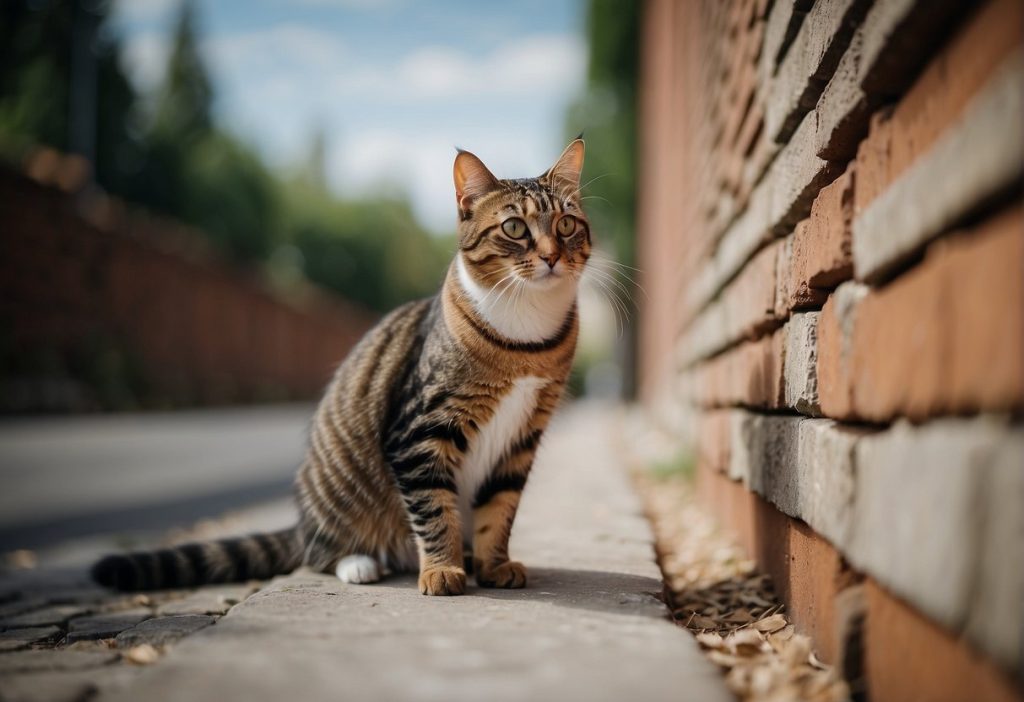
Here’s the scoop on what may be behind this quirky behavior:
- Stress or Anxiety: Just like you might bite your nails, a cat might lick the wall as a stress response.
- Curiosity and Taste: Cats are curious creatures, and sometimes a wall tastes or smells intriguing.
- Texture: Some cats might find the roughness of a wall appealing under their tongue.
- Nutritional Deficiencies: Licking non-food items can sometimes reveal a dietary gap.
- Health Concerns: Occasionally, wall licking can point to an underlying health issue.
While this might seem particularly odd, it’s not uncommon for cats to have their little quirks. Here’s what you can do:
- Observe: Keep an eye on this behavior and any other unusual habits.
- Environment: Boredom can lead to wall licking, so ensure your cat has an enriching environment.
- Diet Check: Review your cat’s diet for any potential nutritional shortcomings.
Remember, most cats occasionally do things that seem strange to us, but they’re often just being cats.
However, if your fluffy friend is a serial wall-licker, it may be time to chat with your vet and rule out any potential health conditions. After all, you know your kitty best!
So, if their wall affinity feels off, a professional opinion can set your mind at ease. And if your cat does have any underlying health conditions, pet insurance can help cover the costs of treatment.
It’s always better to be prepared and have peace of mind when it comes to your beloved pet’s health.
Whether your cat is a wall-licker or has other odd habits, pay attention to these quirks. They’re part of the package of your unique feline companion.
Frequently Asked Questions
Curiosity is part of a cat’s charm! If your feline friend has got you puzzled with their wall-licking antics, you’ve got questions, and we’ve got answers. Let’s unravel why your cat might be giving that wall some unexpected attention.
Is wall licking a sign of illness in cats?
Sometimes, yes. If wall licking is accompanied by other unusual behaviors or symptoms, it could indicate an underlying health issue.
It’s wise to consult your vet to rule out any medical concerns.
Can dietary changes stop my cat from licking walls?
Quite possibly! Nutritional imbalances can lead to some peculiar behavior, including wall licking. Consider evaluating your cat’s diet with a vet’s guidance and make sure it’s complete and balanced.
Should I be worried if my cat occasionally licks the wall?
A sporadic lick here and there is often normal behavior. However, if it becomes frequent or obsessive, that could signal a problem. Keep an eye on how often your kitty engages in this.
How can I distract my cat from wall-licking?
Enrichment is key! Provide plenty of toys, scratching posts, and interactive playtime to keep your cat mentally and physically stimulated, steering them away from the walls.
Could wall licking be a sign of stress or anxiety in my cat?
Your cat could be trying to tell you they’re feeling anxious. Creating a safe and serene environment can help ease their stress. Look out for other signs of anxiety as well and address them promptly.
Are certain cat breeds more prone to wall licking?
It’s not breed-specific, but some cats might have quirky habits more than others. However, if your cat’s breed is known for certain behaviors or health issues, it’s good to be vigilant.
- Free Online Casino Games: What You Need to Know - July 26, 2025
- Ideal Casinos Mobile: The Ultimate Guide to Mobile Betting - July 26, 2025
- The Ultimate Overview to Casino Site Gamings Online - July 26, 2025

